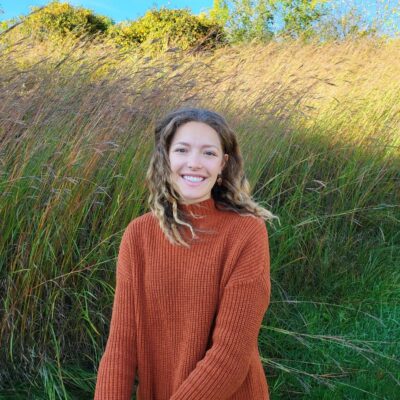Student Spotlight: Lidia Komondy

May 1, 2023
Lidia Komondy is a doctoral candidate in entomology from Grand Rapids, Michigan. She earned a bachelor’s degree from Michigan State University and now studies the ecology of insects that transmit diseases to agricultural crops under the guidance of Brian Nault at Cornell.
What is your area of research and why is it important?
I study the ecology of insects that transmit diseases to agricultural crops. Specifically, I am working with onion thrips, which are insects that feed on and transmit harmful viruses to agricultural crops, such as onions, in commercial vegetable cropping systems. Specifically, I am interested in answering applied research questions using precision agricultural tools such as machine learning, hyperspectral imaging, and decision-support algorithms that can be used to formulate sustainable and cost-effective management strategies for growers that will bridge that gap between increasing agricultural challenges and the growing demands of consumers.
What are the larger implications of this research and what is its impact?
The knowledge gained and tools developed from my research will inform more sustainable and cost effective pest and disease management tactics for growers in different agricultural industries. With climate-related changes to the region, invasive pest species, and economically devastating plant pathogens, it is becoming more difficult for growers to manage these challenges while producing adequate crop yields. This research will help them formulate more efficient and sustainable management strategies that will result in increased crop protection, reduced pesticide use, and cost-savings. This research serves as a blueprint for adaptation in other cropping systems as well.
You were named second place winner in the 2023 Three Minute Thesis (3MT) competition. Can you describe the process of condensing your research into a three-minute presentation?
Before I started condensing my research into a three-minute format, I discussed my project with friends and family outside of research to get feedback on the elements that were most important to their understanding. It was important for me to get their feedback, because as much as we hate to admit, academia can be a bubble with a language of its own. Because of this, I knew that I would have blind spots about the concepts I discussed in my talk. After identifying my blind spots, it was a lot easier to build a three-minute elevator pitch from the ground up.
How will you take what you’ve learned from participating in the 3MT and use it in future academic and professional contexts?
Participating in Cornell’s 3MT competition has helped me improve my “elevator pitch” greatly. These skills will come in handy when discussing my research at future conferences, networking events, and even preparing for my dissertation defense. The 3MT competition was a great opportunity to build scientific communication skills that will improve the outcome of my extension and outreach programs where I interact with growers and other stakeholders regularly.
What are your hobbies or interests outside of your research or scholarship?
When I’m not looking at bugs, I enjoy trying new foods, snowboarding, mountain biking, traveling, and spending time with my spouse, Brandon, and our two corgis, Ozzie and Finn.
Why did you choose Cornell to pursue your degree?
My research interests led me to Cornell, primarily my incredible advisor and lab. I also found that after completing my master’s studying ornamental vector entomology, I wanted to return my research focus to applied agricultural research. The doctoral program in entomology was exactly what I was looking for—the opportunity for training and collaboration with great people in multiple disciplines related to entomology, as well as the opportunity to work closely with growers and other stakeholders.
